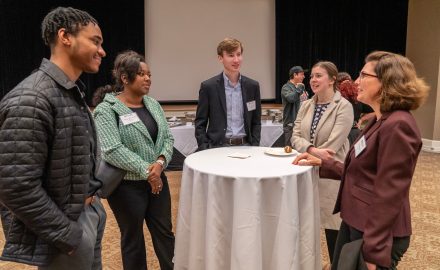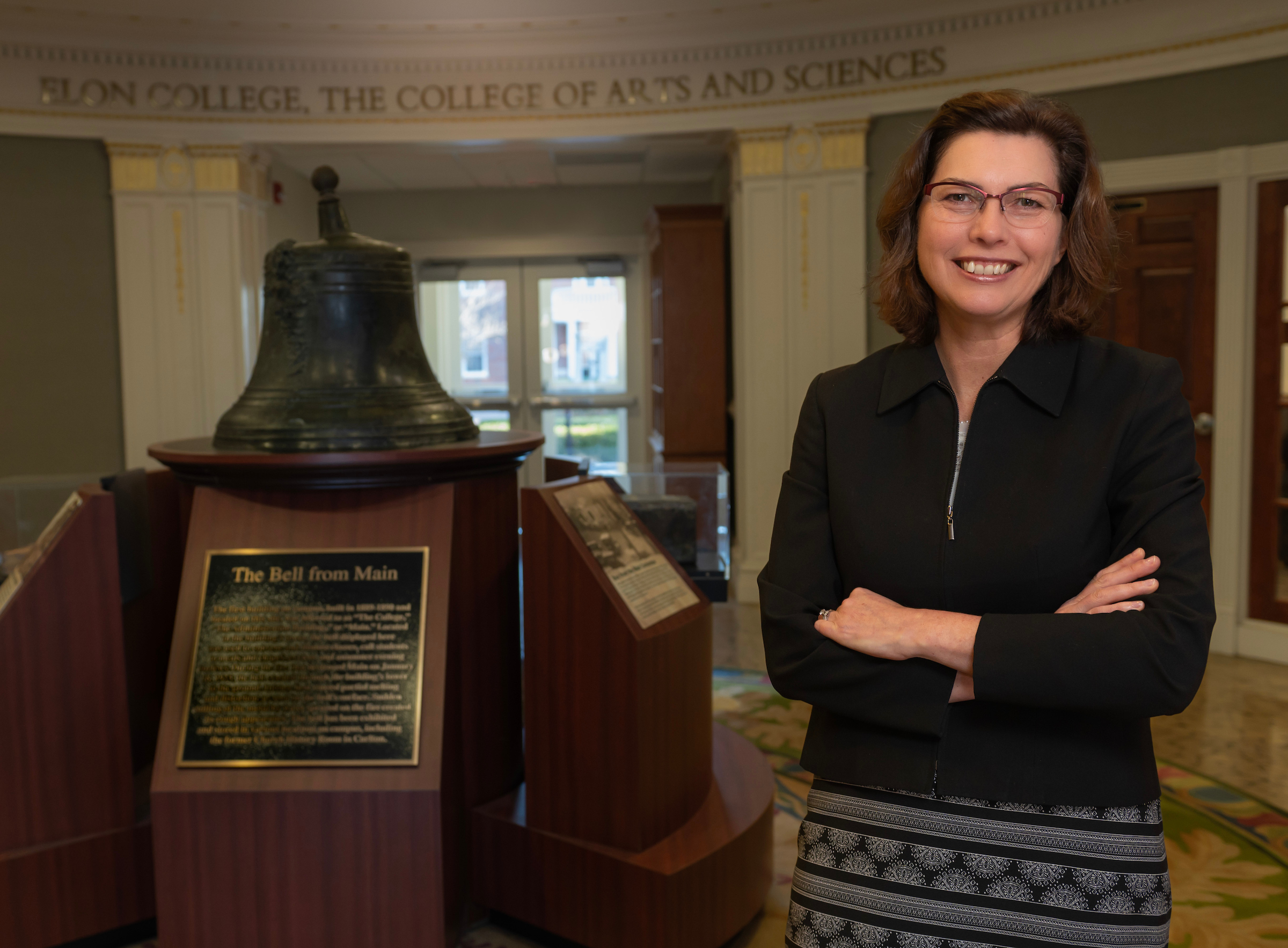Rebecca Kohn joined Elon in early January as provost and vice president for academic affairs, coming to the university from Arcadia University in Glenside, Pennsylvania.
As Rebecca Kohn begins her time as Elon University’s provost and vice president for academic affairs, she has been undertaking an ambitious schedule to learn the people, places and programs of her new higher education home. An accomplished scholar and administrator, Kohn joined Elon from Arcadia University in Pennsylvania and now serves as Elon’s chief academic officer as well as chief operations officer.
Today at Elon caught up with Kohn as she undertakes this critical role at Elon to learn more about what brought her to Elon, how her first month at the university has been and her vision for supporting the success of students, faculty and staff in the years ahead.
You were selected as Elon’s next provost and vice president for academic affairs in the fall, and I’m sure you’ve been busy preparing for this new role. What did you do to prepare to come to Elon?
Even when I was applying for the position, there was work that I was doing to get to know Elon better. I made sure I read Boldly Elon and that gave me such a good sense of the university and its values and its priorities, and that was so useful. I felt the priorities were so similar to what I had been prioritizing during my career and it really made me excited about this job as a possibility. I’m so glad it turned out.
Since being selected, different units around the university sent briefing materials about their units so that I could have background information to read about them. As part of my first 100 hundred days, I have meetings scheduled with a wide range of people from across campus. Of course, I read different articles to find about what was happening at Elon, and now getting to talk to the actual people is helping expand my knowledge about what they’re doing, and I’ll learn more as I go. It’s been a continuum — from prepping for the interview, being hired for the job, preparing for the job and then now just being immersed here.
I certainly knew about the student-centeredness of everything that happens at Elon and it’s been wonderful to see how true that is. In my position, a lot of what I’ll be doing is working with faculty and staff members and administrators who are making sure that the student experience is so good here at Elon. It’s already going so well here and it’s a privilege to be thinking about what we do next when we have a good system in place. How do we make it even better? I look forward to exploring that more.
What was it about Elon that made you want to take on this role that’s so critical to the university’s success?
I certainly knew Elon by reputation. It’s an outstanding institution focused on the student experience and engaged learning. What I saw here at Elon were opportunities to build on the kind of things that I had prioritized throughout my career.

Starting out in my career in academics as a faculty member, I built programs to support student success in my research laboratory. I obtained grant funding for my lab and used funds to support students who might have been underserved in the sciences and used retention rates as one measure of their success. I expanded that work over time through institution-wide programs supported by grants. Even further, I considered how we can support the success of faculty and staff members, and in my administrative roles, I was able to focus more on those areas. For instance, I contributed to initiatives where we brought faculty and staff members to conferences that had to do with countering bias.
The kinds of things that Elon is doing to support success of students, faculty, and staff really ring true to what I had been working on already and I’ll be able to do it in a new space. The values behind what Elon is pursuing were something that I admired and aspire to and have worked on, too.
How do you envision your first 100 days at Elon?
This experience is filled with meeting a lot of people, which is great because they’re representing all different parts of the university. I have been able to engage with some students too. The time has been filled with discovering the really interesting things that people are doing. They might be explaining what their office does or their unit does. I’ve heard different examples of particular initiatives people are developing that are really creative and innovative and our designed to improve an institution that is already really, really good.
How has it been starting your work at Elon during Winter Term, which is a unique time at Elon?
I was glad that I came in in January, because while general activities are happening the campus is a little quieter. Faculty and students were here for classes in January, and I’ve been learning about the winter term study abroad programs. I had a chance to eat in the cafeteria, and it was full, because there were so many students here during Winter Term. It was great to see a vibrant the campus is, even though it wasn’t quite as busy as it will be once the semester starts.
In your role, you serve as chief academic officer. From an academic standpoint, what are some areas you want to focus on to support faculty and student success?
The heart of why students are coming here is for their academic experience, but of course, there’s so much more that they’re involved in beyond the classroom. I think it will be great to think about where students are interested is in future academic programming, whether there are ideas for building on and enhancing expertise we already have or whether there are new areas that make sense for us to start moving into so that students have an academic experience that they’re hoping for.
Something really important about the academic experience is making sure that the classroom is accessible and inclusive, and faculty here at Elon are already pursuing this goal, which will enhance our students’ experiences even further. One way we might be able to see that is in our retention rates, which are already high, and the university is committed to enhancing that even further.
For faculty, I want to support the development opportunities that they need, whether it’s related to their scholarship or to pedagogy. We need to support the development of our staff, who are so important in every aspect of the institution.
Briefly describe an experience with one of your professors that had a long-standing impact on you.
I was a biochemistry major and I was someone who really wanted to have a full experience when I went to college, so I explored all kinds of different things. A liberal arts and sciences environment was perfect for me. ln addition, to majoring in biochemistry, I tried to complete a major in Russian language as well. I also played the trombone in different musical ensembles including the marching band, and I because I love art classes, so I would add art classes when I could fit them in my schedule. I wanted to take advantage of every opportunity I could.
I realized during my sophomore year that there were so many courses required that I couldn’t complete both my biochemistry major and the Russian language major, but I did take enough courses to spend a semester abroad in what was then the Soviet Union. We had a really wonderful faculty member who led the program who was also active outside academia as a translator. She was a role model who gave us a view into what different kinds of careers you could pursue by engaging in foreign language study.
Ultimately, I did not complete my Russian language major, but through my study abroad experience I realized that if I could navigate the Soviet Union, then I could do the same thing in other countries too. Whenever opportunities arose after that to go abroad, I made sure I took advantage of them.
You’re the third consecutive provost at Elon to have an academic background in biology. Is there something about the field that you think has helped prepare you for the role of provost?
That’s such an interesting question because it’s an unusual trend and not something you often see. Something that I’ve found has supported me as an administrator is that with my scientific background, I’m used to thinking about the big picture, asking questions about it, and then thinking about ways to answer that question or address an issue or a problem. I’m also very good at working with data, so I can analyze data sets, think about what the meaning is and how that informs those big picture issues. That scientific background fosters an ability to go back and forth between posing questions on a large scale, thinking about ways to answer them and then using data to help inform how you respond to the questions.
You’ve almost completed your first month at Elon. Lessons learned so far?
What I thought of Elon before I got here — what the priorities are and the quality of the education that’s here — I’ve found to certainly be true. I’ve also learned what a welcoming environment this is through the students, faculty members and staff members I’ve already met. It really is a privilege to be part of an institution that has strong values, lives up to them and truly focuses on making sure that the student experience is the best it can possibly be.
Favorite location on campus so far?
I haven’t determined a favorite yet, but I’m exploring and enjoying that exploration. I’m looking forward to the spring because I’ve heard the campus is even more beautiful in the spring. We’ll see if I develop a favorite place, but for right now, I’m just enjoying it all.



